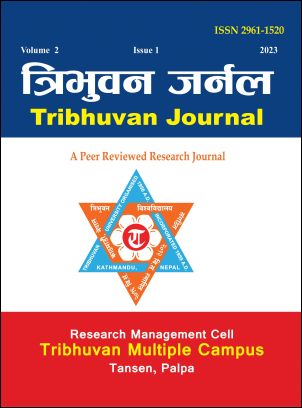Experiences of Lactating Mothers on Breastfeeding and Additional Food Practices
DOI:
https://doi.org/10.3126/tribj.v2i1.60218Keywords:
Breastfeeding, Experiences, Nutrition, Exclusivity, Frequency, DurationAbstract
The rate of exclusive breastfeeding and additional food practices rate remained low in Nepal. It's quite surprising, given the active promotion of breastfeeding and additional food practices by individuals, family members, communities, health institutions, hospital NGOs, INGOs, and the government. Nevertheless, we should continue to spread awareness about the importance of exclusive breastfeeding and healthy food practices for infants. The main objective of this study was to explore the experience of lactating mothers, who often struggle to manage additional food practices for their babies. The study was based on narrative theory and included a small sample group of two mothers, who shared their experiences of breastfeeding. Despite the challenges, the mothers in the study remained committed to providing their babies with the best possible nutrition and care. By sharing their stories, they hope to help other mothers who may be facing similar difficulties. During the research, a qualitative-descriptive research design was adopted, and purposive sampling was used to select participants. The data was gathered using verbatim audio recordings of in-depth interviews, and interview transcriptions were analyzed using the qualitative content analysis approach. It was found that all participants were still breastfeeding at the time of the interview. The analysis of the interview transcriptions generated 46 nodes, 8 sub-themes, and 2 key themes. The two key themes that emerged were "Challenge and support for breastfeeding" and "Nutrition and additional food practices." The research provided valuable insights into the experiences of breastfeeding mothers and the factors that impact their feeding practices. Our findings show that these mothers adopt positive practices such as feeding colostrum, exclusively breastfeeding, timely introduction of additional foods, and continuing to breastfeed. To ensure that more mothers have successful breastfeeding journeys, it is crucial to increase public awareness and support for breastfeeding through education, social support, and laws that promote it. Additionally, involving family members in the process can significantly contribute to the success of breastfeeding.




